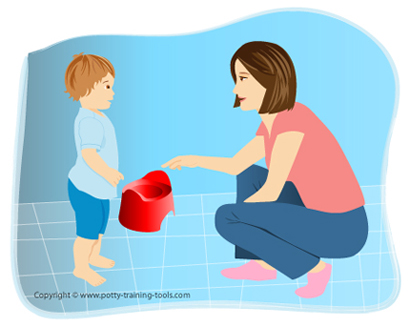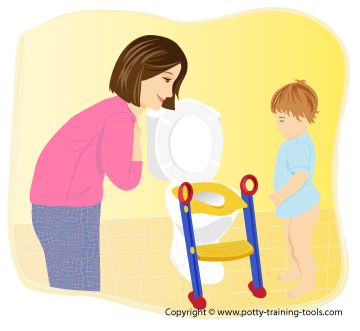Toilet Training Readiness
Behavioral-wise
Talking to a certified parenting advisor about toilet training readiness in the behavioral sense
Whenever searching online for information about Toilet training readiness, I usually come across a generic list of “readiness signs” that lacks depth in my opinion.
So I’ve decided to take it up for discussion with Alona Oren, a professional parenting consultant with whom I had an extensive interview about toilet training.
Credits:

Alona Oren:
Family Consultant certified by "Maagalim" Psychology Institute and the Ministry of Education (Israel) * Parenting Facilitator certified by Adler Institute and the Ministry of Education (Israel)
Alona bases her work widely on the Adlerian psychology school (see Adlerian psychology--Wikipedia), and combines other approaches such as behavioral - cognitive psychology and Imago Relationship Therapy.
The information presented in this page is based on a two-hours 'interview' I conducted with Alona on January 2012.
At what age should we start?
Question:
In your view, what is the recommended age to start potty training? Also, is there a certain max age that you’d recommend not to pass when starting potty training?
Answer:
Generally speaking you can start potty training at 18 months. More commonly and recommendable is to start between 2 to 2.5 years old.
The wishful situation is to complete daytime potty training until the child is 3 years old, and to complete nighttime potty training by the age of 5.
Despite what we wish as professionals and as parents, there are many kids who experience difficulties, regressions and delays in potty training.

What is toilet training readiness?
Question:
Do you normally recommend waiting until the child shows signs of toilet training readiness? Is it OK for the parent to initiate the training regardless of readiness-signs?
Answer:
I think that there has to be some maturation on the child’s part. Yet, as with any other educational matter, the parent has to be responsible for leading the process.
In regard to maturation and toilet training readiness, the parent has to be aware of the following aspects: Physiological, Cognitive or Behavioral, and Emotional. Emotional readiness is a subset of behavioral.
- Physiological readiness:
- The child has to be aware of his peeing and pooping urges. Ideally, he’ll tell the parent when he needs to go (this one has to do more with Cognitive readiness).
- Has to be able to sit on a potty or potty training seat
- Has to be able to remove his diaper or underwear, and have some independence in dressing-up.
- Cognitive and Behavioral readiness:
- The child can restrain himself and withhold gratification in other aspects of life, such as: When mom tells him to “wait a few minutes, I’m on the phone and I’ll be with you soon”.
- Preferably, we’d like to see the child in a stage that he tells mom/dad about having peed or pooped in the diaper, and even asks us to change the diaper.
- Showing interest in the toilet, noticing mom/dad or older siblings using the toilet, or other kids from Daycare -- can also work for the advantage of toilet training, especially if we act on it and use the momentum.
- Emotional readiness: A subset of cognitive/behavioral readiness. It goes to having, as much as possible, a "clean environment" in regard to the parent-child relationship before we start potty training. Because if there are emotional issues in the background, they are likely to come up and interfere with the toilet training.
Question:
You’ve said here that one of the things we’d like to see in our child’s behavior that indicates maturity for potty training is the ability to withhold or postpone gratification. Like being able to wait while mom is on the phone, etc.
If my child is not very strong in postponing gratification, and let’s say I’ve been “spoiling him” up until now, as it would often happen with a first child… I suppose it’s going to take some time and practice to make a change, if I'm aware of it.
So I guess my question is: Would you recommend holding off potty training until I’ve had the chance to do some serious changes in my parenting? Until I see the desired changes in my child's behavior
Answer:
I think it should go in parallel. You can take potty training as a wonderful opportunity to build your parenting-model in the way that you want it to be, and to build effective relationship with your child. Relationship that include setting expectations from your side.
You don’t need to postpone or hold off potty training for that, just be aware of it and put thought into it.
Question:
One of the things that I had experienced with my two older kids before they were potty trained, was that they’d never told me about having a wet or dirty diaper. It didn't seem to bother them. So for me, I think that if I had waited for this particular 'cognitive sign' to appear, I might have waited another year or so to start potty training. What do you think?
Answer:
It could be a physiological issue. Some kids are intolerant to the sensation of a wet/dirty diaper, others may be less sensitive, and some may even like it. The sensitivity-threshold is innate, and is different from one child to another.
Still, there are things we can do/say as parents, before starting potty training, to encourage our child to become more aware and more verbal about making Pee or Poo in the diapers.
Alona continues:
Cognitive readiness is also about “wanting to be a big boy” and do things on my own. This striving for independence usually appears around the age of 2. Parents can “leverage” it and work it to the advantage of toilet training.
When a child this age is not motivated to act like a big boy, and especially if he’s acting against it, there usually will be a reason behind it and I recommend parents to look more deeply into that. Otherwise, this might cause setbacks in toilet training and in other educational matters.
For instance, there could be some emotional issue in the background, in the relationship with the parents, which causes the child to think “it’s not worth it to me to step up”, or “I’d rather have mom-dad do this thing for me instead of doing it on my own”.

Can parents "bypass" toilet training readiness?
Question:
Do you think that there are certain children, who if you leave it to them to “become ready” for potty training, and you wait until you can actually see toilet training readiness signs on their part, you’ll end up waiting a long time, until they pass 3.5 years or even 4?
Is it a better approach with such kids, for the parent to initiate potty training without waiting for maturation?
Answer:
I think it’s possible, yes. It’s possible that some kids are in general less sensitive or less aware to hygiene education. It might take them more time to “get there”, and it’s possible that they’ll need more pushing from the parent in this sense.
To conclude the subject of toilet training readiness and what is the right time to start, I’ll state again that it is our responsibility as the parents to lead the toilet training process.
In this context it means that the parent has to really “see” the child (beyond the visual sense) and be aware of his maturity.
Then, it’s either that I’ve noticed enough signs that are indicating my child is ready -- or -- we’ve reached the right age (2 – 2.5).
If we’ve reached that age and I’m not seeing enough signs that indicate readiness, I can start initiating things, and there are specific actions that parents can do in this context, to encourage their child and help the maturation.
Return from Toilet Training Readiness Behavioral-wise to Potty Training Tools Home Page